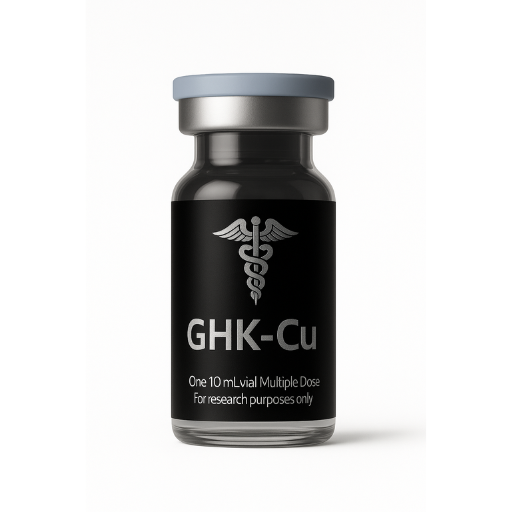GHK-Cu (glycyl-L-histidyl-L-lysine:copper(II)) is a naturally occurring copper-binding tripeptide investigated for roles in dermal remodeling, angiogenic signaling, and anti-inflammatory modulation. The 50 mg research format supports controlled studies of extracellular-matrix (ECM) renewal, cellular migration, and redox-metal homeostasis in skin, connective-tissue, and wound models.
Copper Delivery: GHK chelates Cu2+, facilitating bioavailable copper transport to
cuproenzymes (e.g., lysyl oxidase, superoxide dismutase) implicated in crosslinking and redox defense.
ECM Programs: Literature reports upregulation of collagen and glycosaminoglycan synthesis with
concurrent modulation of MMPs/TIMPs, supporting balanced matrix turnover and re-epithelialization.
Cell Signaling: In vitro models evaluate pathways linked to integrin/focal-adhesion dynamics,
TGF-β remodeling cues, and cytokine tone reduction in inflammatory microenvironments.
Angiogenesis & Repair: Pro-migratory and pro-angiogenic effects are profiled via endothelial and
fibroblast assays that index neovascularization and tissue closure kinetics.
Dermal/wound-healing models • Scar modulation and ECM remodeling • Copper homeostasis and antioxidant defense (SOD activity) • Keratinocyte/fibroblast migration assays • Collagen/GAG synthesis readouts • Angiogenesis and microvascular integrity studies.
Revitalized Health peptides are produced under cGMP-aligned conditions with pharmaceutical-grade inputs. Each GHK-Cu lot is confirmed at ≥99% purity by HPLC with structure/identity verified via LC-MS/MS. Appearance and solubility are checked; microbial and endotoxin limits are monitored to research-grade specifications. Batch Certificates of Analysis provide full analytical parameters and results.
Store lyophilized GHK-Cu at 2–8 °C, protected from light and moisture. Following reconstitution with suitable diluent, maintain at 2–8 °C and utilize within 20 days. Avoid repeated freeze–thaw cycles. Use low-metal, low-binding plastics/glassware to minimize trace-metal exchange during experiments.
For laboratory research use only. Not intended for human consumption, therapeutic, or diagnostic application. Supplied exclusively to qualified professionals conducting controlled scientific investigations.
Formulated for research applications. Purity, identity, and lot analytics available per batch. Not medical advice.
Target: Copper(II) delivery via tripeptide Gly-His-Lys; interacts with ECM/cell-surface binding sites.
Mode: Chelates Cu²⁺ to form GHK-Cu, supporting copper-dependent enzymes (e.g., lysyl oxidase, SOD). Promotes ECM remodeling (↑ collagen I/III, elastin, glycosaminoglycans), pro-repair gene programs, angiogenic support, and modulation of inflammatory cytokines (↓ IL-1β/TNF-α signatures in models). In hair/skin models, influences dermal papilla activity and keratinocyte/fibroblast signaling.
Analytics: Identity/purity by HPLC and LC-MS; copper loading by UV-Vis (d–d band) and ICP-MS; stability/metal exchange assays; in-vitro readouts: procollagen C-peptide ELISA, MMP/TIMP balance, SOD activity, ROS assays; dermal imaging or ultrasound for thickness/elasticity in cosmetic studies. Safety monitoring: local dermal tolerance; systemic copper indices where relevant.
Educational research-style content. Not medical advice or a treatment claim.

